(Bloomberg) -- These should be jubilant times across the sprawling savanna of southeastern Brazil. Soybean is king here. And with the China-U.S. trade war pushing Chinese buyers to frantically search the globe for alternatives to American soy, Brazil is the most logical first stop.
But not only are farmers not boosting sales to take advantage of this sudden jump in demand -- and prices -- they’re actually halting them.
In an untimely twist that seems to epitomize everything that’s gone wrong with Brazil’s economy in recent years, the government imposed a rule change in late May that pushed up freight costs as much as 150 percent, squeezing farmers’ profit margins so much that many are just letting the remaining soy from the last harvest pile up in silos along with corn that’s currently being reaped.
In other words, even when the country is handed an absolute gift -- a surefire victory produced by a geopolitical squabble far away -- it squanders the moment. Sure, the transport increase could be rolled back in time for farmers to start tapping into the higher prices. But what if the U.S.-China spat fades quickly?
‘Blowing’ an Opportunity
“We may be blowing a great opportunity,” says Bartolomeu Braz Pereira, head of Aprosoja, the soybean association that is Brazil’s biggest farm group.
Take the example of Ricardo Arioli, a farmer in Mato Grosso state, the heart of soybean country. He froze advanced sales on his 2018-2019 harvest weeks ago and at this point has only sold 8 percent of that crop. At this time last year, he had already sold 40 percent of the upcoming harvest.
"Nobody wants to buy or sell soybeans,” Arioli, 58, said. “Farmers are the most hurt by this situation.”
The minimum freight cost rule was rolled out in May in a bid to appease truckers who had launched a nationwide strike to protest surging fuel costs. The strike lasted 10 days, long enough to cause the biggest one-month drop in Brazil’s economic activity gauge since at least 2003. Ironically, farmers were originally supporting the strike because they thought it would lead to lower fuel prices. None of them were expecting the government’s solution would be a mandatory increase in freight charges.
‘Stuck With the Bill’
Farmers are bearing the brunt of the added expenses because the traders who buy from producers and export the crop usually discount freight costs from prices paid to growers.
The freeze on farmer sales isn’t having much impact on traders so far, since they’re exporting from stockpiled supplies. That means the middleman is reaping the lion’s share of the wealth as domestic soybean premiums surge on robust Chinese demand.
“Farmers will get stuck with the bill,” Arioli said. “I’m sure about that.”
Adding to the confusion: several industrial and agriculture groups have challenged the new freight laws in court. Grain selling has almost completely dried up thanks to the murky outlook.
"Premiums and exchange rates are in our favor,” said Pereira of Aprosoja. “We should be making big sales, but this is not happening because of the freight uncertainty.”
The freight obstacles may also hurt production for the next crop, according to Pereira, who is also a farmer in Goias state. Higher transport costs mean fertilizer prices have jumped about 20 percent from a year ago, according to Mato Grosso’s rural economy institute Imea. Deliveries have also been halted. Producers may be forced to delay seeding or they could decide to reduce fertilizer use, which may hurt yield potential, Pereira said.
"Internal problems have stopped us from taking advantage of the battle between China and the U.S.,” he said.
